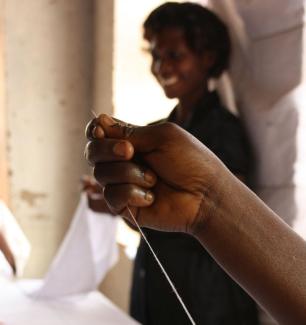Investment climate
Budding businesses

Annick Kabatesi wants to make Burundi the fashion capital of eastern Africa. Her own firm Murundikazi markets a range of products. Besides clothes, it includes accessories and household items which are made from used plastic bags. In 2014, the East African Community passed several measures to reduce plastic waste. Burundi was one of the first countries to ratify those measures. “If we can utilise these clean-up initiatives effectively, we can establish more robust sustainable business models like this all over Africa,” Kabatesi says. The carbon footprint of her goods is minimal she says, because the plastic she uses was produced and disposed of. Kabatesi emphasises that all her products are locally sourced and create local employment.
Burundi is seeing substantial growth in its business climate. Anny Darlene Ndorimana, founder of the consultancy RC Retraining, says: “Entrepreneurs are determined to create a robust business culture in Burundi.” This is especially true in the emerging fashion and textile industries. Ndorimana explains that digitalisation is making markets more accessible and states: “This is a great time for business expansion in Burundi.”
As Ndorimana stated during a panel discussion in Stuttgart in April, some small and medium-sized enterprises (SMEs) are beginning to copy the German model of vocational training by developing apprenticeships for young people. Stuttgart is the capital of the Baden-Württemberg, the German state that has a partnership with Burundi. The event was hosted by the SEZ, the state’s foundation for development cooperation (Stiftung Entwicklungszusammenarbeit).
Ndorimana believes there is a chance to create a sustainable business climate: “Burundi needs to experiment with business models that work best for locals and must look to create their own unique direction for private sector growth.” Young entrepreneurs still face several difficulties. Major obstacles include finding adequate financial partners and institutional support. Ndorimana hopes that the government will contribute to improving the business environment for SMEs.
Ginette Karirekinyana is the founder of Karire products. Her business is fighting Malaria. She sells a mosquito-repellent soap and a tea that reduces consumer’s risk of mosquito bites. In her eyes, the Malaria problem should be mitigated through the use of local resources. “I want to allow Burundians to have alternatives to more expensive and often not available western drugs that help fight malaria.” Karirekinyana says. She uses locally sourced plants and herbs with mosquito-repellent qualities. She says she is proud that “my home-grown enterprise can help to achieve the UN Sustainable Development Goals.”







